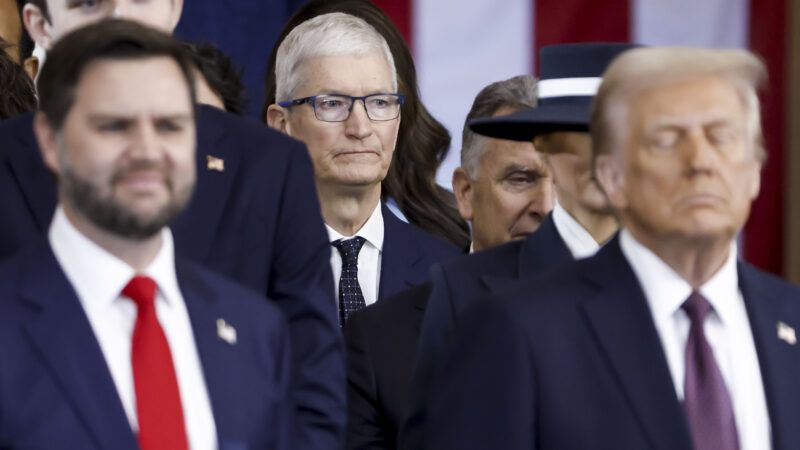Trump's Tariffs Are Causing an Economic Boom for D.C. Lobbyists
More lobbyists are spending more money to influence trade policy. The swamp is having a great time during the trade war.

President Donald Trump's trade war is causing economic problems for American manufacturers, farmers, energy producers, big box stores, small businesses, investors, and consumers.
But there is one industry that's prospering due to tariffs: Lobbying firms in Washington, D.C.
Lobbying expenditures on trade issues were a staggering 277 percent higher in the first quarter of 2025 than in the first quarter of 2024, according to data reported to the clerk of the House of Representatives and compiled by Advancing American Freedom Foundation, a conservative nonprofit. In raw dollars, lobbying firms reported spending $4.9 million on trade-related issues in the first three months of this year, up from $1.3 million during the same three months in 2024.
There's also been a huge expansion in the number of lobbying firms working on the tariff issue. According to the House data, 212 different entities registered some spending on tariff lobbying in the first quarter of this year, up from just 89 that worked on tariff issues in the first three months of last year.
And the average cost to businesses is increasing too. Compared to last year, the average tariff lobbying contract is now 21 percent higher, according to AAFF's analysis.
None of this should be particularly surprising, even though the numbers paint a stark picture. Lobbying is not a side effect or unintended consequence of protectionist policies, but a fundamental component of them. If the federal government has the power to impose massive new taxes on Americans—without so much as a vote from Congress—businesses have a tremendous incentive to lobby for exclusions from those taxes.
"Although President Donald Trump popularized calls to 'drain the swamp,' his favorite policy tool, tariffs, has actually enlarged it and generated a massive financial windfall for K Street lobbyists while hardworking American families pick up the tab," writes Joel Griffith, policy adviser at AAFF, in the Washington Examiner.
In practice, that means some businesses have sought relief from tariffs for themselves while pushing for higher tariffs on competitors. Haas Automation, for example, published a statement earlier this month detailing how Trump's tariffs had "reduced production" and "halted hiring" at its manufacturing plant in California. The statement asked the Trump administration to reduce tariffs on the raw materials that Haas needs for its production of heavy equipment, while simultaneously arguing for high tariffs on competitors that import finished goods from places like Japan, South Korea, and Taiwan.
The Haas statement is a rare public display of a dynamic that is surely playing out across Washington right now, as lobbyists seek preferential treatment for their clients while trying to push the costs of tariffs onto competitors. Even as Trump seeks to roll back parts of his tariff agenda, those incentives will remain in place. That's a formula for corruption and cronyism, and it goes to show how protectionism entrenches bad incentives. Every dollar that a company spends on lobbying is a dollar that cannot be used to pay workers, research better products, or reward investors.
This is also exactly what happened during the first Trump trade war. A Lehigh University study published last year found that politically connected firms—specifically, those that donated to Republican candidates, including Trump—were more likely to succeed when asking the government for an exemption on imports that would normally be subject to tariffs.
But, of course, not everyone can afford to hire a lobbyist or make big campaign contributions. Many small businesses facing the higher costs of tariffs will simply have to raise prices and suffer through supply chain disruptions. A majority of Americans say their personal financial situation is getting worse, according to the latest Gallup poll, and the uncertainty created by Trump's chaotic tariff decisions is reducing investment and confidence in the American economy.
But on K Street, everything is going great.


Show Comments (16)